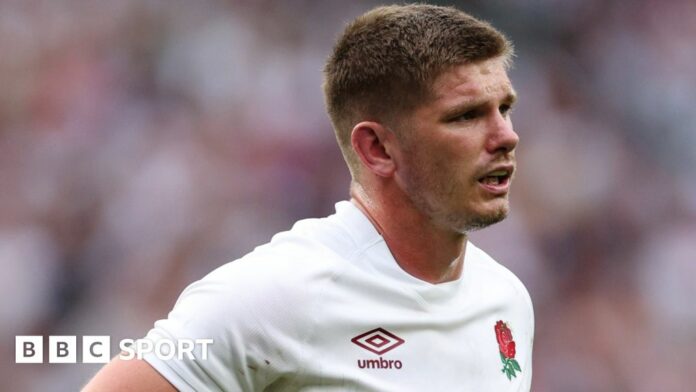
[ad_1]
Image source, Getty Images
Image caption, Owen Farrell (right) had to sit on the sidelines at Twickenham before the decision was made in the bunker to send him off
16 August 2023
The decision to overturn Owen Farrell’s red card has split the rugby world.
An independent judicial committee (IJC) has rescinded the England captain’s dismissal against Wales, clearing him to play a key role for England at the upcoming World Cup.
Farrell became the first England player to receive a red card from rugby’s new ‘bunker’ review system after a high tackle on Taine Basham during England’s 19-17 win over Wales last week.
The three-game ban that the red card would have incurred would have meant Farrell missed England’s remaining warm-up games with Ireland and Fiji, as well as their World Cup opener with Argentina on 9 September.
Professor John Fairclough of player welfare group Progressive Rugby said the decision to rescind the red card made a “mockery” of health concerns within the game, but France defence coach Shaun Edwards said “justice had been served” for Farrell in his Mail column.
‘I can see why the decision was made’
At Tuesday’s hearing, Farrell acknowledged he had committed an act of foul play but denied it was worthy of a red card.
The IJC said Farrell had mitigation because of the “sudden and significant change in direction from the ball carrier” caused by Jamie George pushing Basham just before the contact.
Former Ireland international Shane Horgan, who also practices law, said the RFU and its barrister Richard Smith KC will have looked at World Rugby’s mitigation criteria before presenting their case.
“Having watched it [Farrell’s tackle] many times and having looked at the laws that were implemented, I can see why the decision was made,” Horgan told the Rugby Union Weekly podcast.
“I looked at the closeness of the two players when the change of direction occurred – it was less than a metre and they were both moving forward.
“So you can imagine Smith talking about the reaction time being a fraction of a second and how it was impossible for Farrell to move out of the way.
“Then you take into account the height of the hit. It was actually close to the ball and it would have slid up.
“Do I think it’s in the overarching best interests of the game? No.
“But I don’t think that came into the decision making process. I do not agree these laws are fit for purpose. They are overly complex and they are subjective.”
Horgan also believes the entirely Australian panel may have impacted on the outcome.
He added: “I think the southern hemisphere still lags behind slightly in this area [of player welfare]. I hear it in their commentary and from their coaches and their former players so I do think maybe that contributed to how this was presented, perceived and accepted.”
What are the criticisms?
Farrell has been in hot water before. The 31-year-old returned from a four-week ban to play in England’s Six Nations opener with Scotland earlier this year after a high tackle on Gloucester’s Jack Clement for Saracens in January.
Former England fly-half Paul Grayson says Farrell had set himself to make a shot on Basham and does not agree George’s involvement served as much of a mitigation.
“George is grabbing for Basham and he knows he is beaten,” Grayson told Rugby Union Weekly.
“It’s Basham’s fend which accelerates him away from George but I don’t get the ‘significant change in dynamic’. I see Owen Farrell set to make a shot.
“It was a similar tackle on Esterhuizen as he gets his body across the attacker and hits with his dominant right shoulder.
“I never thought he was in position to make a low and safe tackle and the other bits are interference because I don’t think that would have changed what he was about to do.”
Farrell attended World Rugby’s tackle school before this year’s Six Nations, to re-educate banned players on the importance of tackling lower for safety, but former Scotland Andy Nicol said the fly-half “has not learned anything”.
“I’m not even sure Owen Farrell thought he was going to get away with it,” Nicol told Rugby Union Weekly.
“For me this goes to the heart of player welfare. If rugby is serious about bringing the tackle height down then tackles like that must be a red card.
“I don’t accept the mitigation. There was no way that is a ‘sudden and significant change’. I think it’s wrong and I think England have argued it very well.”
What’s next for Farrell and England?
Farrell is eligible for selection immediately and is expected to steer England from fly-half during the World Cup in France.
The experienced number 10 is set to play at his third World Cup after featuring in 2015 and 2019.
England face Ireland in Dublin on Saturday before ending their preparations against Fiji at Twickenham the following weekend.
[ad_2]
Copyright for syndicated content belongs to the linked Source link


